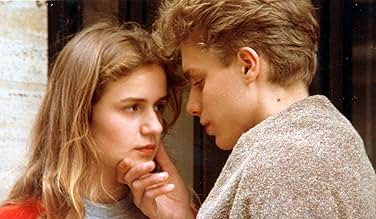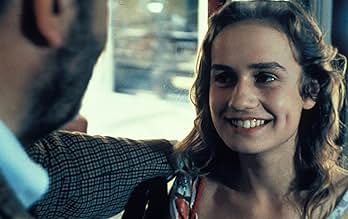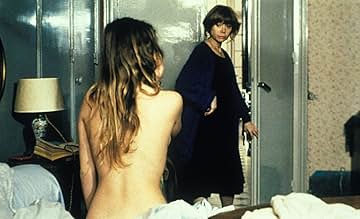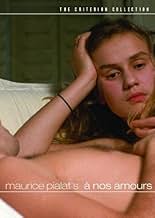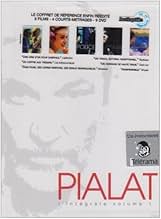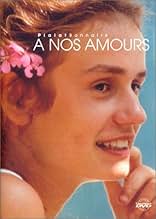CALIFICACIÓN DE IMDb
7.1/10
7.6 k
TU CALIFICACIÓN
La familia de una joven errática intenta desesperadamente evitar sus formas cada vez más eróticas.La familia de una joven errática intenta desesperadamente evitar sus formas cada vez más eróticas.La familia de una joven errática intenta desesperadamente evitar sus formas cada vez más eróticas.
- Dirección
- Guionistas
- Elenco
- Premios
- 4 premios ganados y 3 nominaciones en total
- Dirección
- Guionistas
- Todo el elenco y el equipo
- Producción, taquilla y más en IMDbPro
Opiniones destacadas
This is the story of a teenage French girl (Sandrine Bonnaire) with a difficult home life. Both her father (who abandons the family) and her older brother (who regularly physically assaults her) seem to have an unnatural interest in her sexuality, while her mother (who may the worst of them all) is a raving hysteric who eggs everyone else on. Not surprisingly, the girl is quite promiscuous, availing herself of any number of boys and men. In an American movie like this, her male paramours would at best be panting dogs and at worst villainous cads taking advantage of a vulnerable girl, but here they're probably the most sympathetic people in the movie!
The young girl is not unsympathetic by any means, but she simply refuses to be a victim and remains firmly in control, and no family member or lover ultimately seems to have much chance against her. She is similar to the kind of "feminist lolitas" that often appear in Catherine Breillat movies like "A Real Young Girl" and "36 Fillete"-- teen girls that are very desirable, but also wise beyond their years and in perfect control of their own sexuality, and thus never simply mere sex objects. It's surprising Bonnaire never worked directly with Breillat because she is a much more self-assured and commanding actress than any of the ones Breillat did work with. I don't know if I believe the IMDb dates regarding Bonnaire's age as her assured acting (and her nude body) suggest that she was somewhat older than the character she's playing here, but she's very impressive regardless. Interestingly, while she became a very formidable actress in her later years (especially in films like Claude Chabrol's "Initiation"), she would not really be one of your more glamorous and sexy French actress. She certainly compares well to her contemporaries at the time like Emmanuelle Beart and Sophie Marceau, but while they would become leading ladies, she stayed more of a character actress.
Ironically, the one problem I had with the movie is that Bonnaire and her character is perhaps TOO self-assured and as an actress Bonnaire tends to dominate the rest of the cast too much. It might be a feminist statement to have young female protagonist who is this self-confident, but I don't know that it's necessarily very realistic.
The young girl is not unsympathetic by any means, but she simply refuses to be a victim and remains firmly in control, and no family member or lover ultimately seems to have much chance against her. She is similar to the kind of "feminist lolitas" that often appear in Catherine Breillat movies like "A Real Young Girl" and "36 Fillete"-- teen girls that are very desirable, but also wise beyond their years and in perfect control of their own sexuality, and thus never simply mere sex objects. It's surprising Bonnaire never worked directly with Breillat because she is a much more self-assured and commanding actress than any of the ones Breillat did work with. I don't know if I believe the IMDb dates regarding Bonnaire's age as her assured acting (and her nude body) suggest that she was somewhat older than the character she's playing here, but she's very impressive regardless. Interestingly, while she became a very formidable actress in her later years (especially in films like Claude Chabrol's "Initiation"), she would not really be one of your more glamorous and sexy French actress. She certainly compares well to her contemporaries at the time like Emmanuelle Beart and Sophie Marceau, but while they would become leading ladies, she stayed more of a character actress.
Ironically, the one problem I had with the movie is that Bonnaire and her character is perhaps TOO self-assured and as an actress Bonnaire tends to dominate the rest of the cast too much. It might be a feminist statement to have young female protagonist who is this self-confident, but I don't know that it's necessarily very realistic.
"The only time I'm happy is when I'm with a guy," says Suzanne, (Sandrine Bonnaire) a promiscuous and directionless teenager. Suzanne's parents are splitting up; her brother beats her as a disciplinary gesture in her father's absence; and her mother has control over nothing. Suzanne hangs out with her friends; sleeps with anyone she is attracted to (except the boy that loves her); and returns home for knock down, drag out fights with her older brother and mother. The last 30 minutes of the film skips quickly into Suzanne's life after marriage and jumps yet again to her life after divorce. The only person Suzanne loves is her father; perhaps because he is the only person who understands and unconditionally loves her. Fine direction from Maurice Pialat who also plays Suzanne's father. Excellent acting from most of the cast saves a somewhat meandering and overwrought script.
15-year old Suzanne (Sandrine Bonnaire) is a precocious child, living with her mother, her career-driven brother, and her sometimes overbearing father (played by Maurice Pialat). She has recently split from her boyfriend and is intent on moving from man to man in search of sexual pleasures and guardianship. When her father splits from her mother and moves out, home life becomes unbearable as her mother and brother disapprove of her lifestyle. She is most comfortable in the arms of a man, be it one of her seducers or her father. Men seems to flock to her, as she is pretty, charming and is happy to accommodate her admirers.
This is the second film that I've seen directed by French master Maurice Pialat, the other being the excellent L'Enfance Nue. They are both similar films in terms of themes and execution, and tell the familiar coming-of-age story from an original perspective. Whereas the former was a sledgehammer portrayal of a young juvenile causing havoc amongst the various foster homes he was placed, where redemption never seems possible, A Nos Amours' Suzanne is a more sympathetic lead character, and her journey is portrayed in a more subtle manner. While it would be shocking to hear of a 15 year old girl bedding a number of men, Pialat is more focused on what drives her to act this way.
She is not a tease, and she doesn't flaunt her body to anyone who will look. Instead, she seems to simply enjoy the comfort of a man. When the father moves away, her home life falls apart and her bed-mates increase. Perhaps Pialat is trying to portray the impact an absent father can have on a child, or that all women need comforting every once in a while. Or maybe this is an individual character study, with no overriding message. What it most definitely is, though, is a wonderfully acted (especially from the young Bonnaire), intelligent, and intriguing film that has Pialat's usual cold detachment alongside a certain intimacy with the lead character.
www.the-wrath-of-blog.blogspot.com
This is the second film that I've seen directed by French master Maurice Pialat, the other being the excellent L'Enfance Nue. They are both similar films in terms of themes and execution, and tell the familiar coming-of-age story from an original perspective. Whereas the former was a sledgehammer portrayal of a young juvenile causing havoc amongst the various foster homes he was placed, where redemption never seems possible, A Nos Amours' Suzanne is a more sympathetic lead character, and her journey is portrayed in a more subtle manner. While it would be shocking to hear of a 15 year old girl bedding a number of men, Pialat is more focused on what drives her to act this way.
She is not a tease, and she doesn't flaunt her body to anyone who will look. Instead, she seems to simply enjoy the comfort of a man. When the father moves away, her home life falls apart and her bed-mates increase. Perhaps Pialat is trying to portray the impact an absent father can have on a child, or that all women need comforting every once in a while. Or maybe this is an individual character study, with no overriding message. What it most definitely is, though, is a wonderfully acted (especially from the young Bonnaire), intelligent, and intriguing film that has Pialat's usual cold detachment alongside a certain intimacy with the lead character.
www.the-wrath-of-blog.blogspot.com
Being so restrained, blunt and straightforward, Pialat's film is also enormously touching. The concreteness of the world he creates here is tangible. Psychological realism true in each detail, and as ensemble. The brutal restraint is somehow disconcertingbeing given the bad habits inflicted by the standard psychology of most other films. Pialat's project was a naturalist one, hence the impression of a thing just begun, just started, still in progress. (It would be, anyway, absurd and stupid to try reducing Pialat's implicit aesthetics to some theoretical statements and criticism's clichés.) What is obvious is that Pialat achieved his aimfinding the fourth dimension of this coming of age story. For me,Pialat might not be worthy of love; he is certainly worthy of respect. In his moviesnot only in this one, but in several others as wellone finds not only probitybut also genuine power, inspiration, the strength of a secret master, Pialat. Good and serious director, keen psychologist, avid of femme's perfume and scent, intelligent and uncompromising.
In psychology, Pialat rightly perceived the distances and the gaps and ,as it were, the laws of the perspective. In this movie, Pialat uses this sensational and hidden knowledge to tell the tribulations of a gamine.
The amazing lead actress is worth seeing; with her, the film took one more chance at the ineffable.
Any movie is made with elements,but it lives out of the rapports and the ideas.On the cinematographic elements' level,Pialat's movie is austere.There is no bit of stylization,but each element has a 4th. dimension:the rapports' level.This dimension is widened by the music.Purcell's suitable music gives the action a strange coherence.The movie is made out of relations,rapports,reflections.Far from being some kind of a flat realism,Pialat's movie lives entirely out of this wealth of thought.
Most important,this strengthener,firm,intelligent,bitter,even poignant realism is not fake.
A courageous decision is the refusal of all stylization.(The "cruel movie",the ferocious movie relies on stylization.)True realism means ideas,reflection,a lively mind.Far from being mechanical and passive,it is fertile and elastic.
This movie is also a medicament.
I find it disappointing that only 3 comments were written here for "À nos amours ".Also,the weighted average vote of 7.5 / 10 is unfair.
Miss Bonnaire is a standout.Her cinema presence in "A Nos ..." surrounds the viewer.
In psychology, Pialat rightly perceived the distances and the gaps and ,as it were, the laws of the perspective. In this movie, Pialat uses this sensational and hidden knowledge to tell the tribulations of a gamine.
The amazing lead actress is worth seeing; with her, the film took one more chance at the ineffable.
Any movie is made with elements,but it lives out of the rapports and the ideas.On the cinematographic elements' level,Pialat's movie is austere.There is no bit of stylization,but each element has a 4th. dimension:the rapports' level.This dimension is widened by the music.Purcell's suitable music gives the action a strange coherence.The movie is made out of relations,rapports,reflections.Far from being some kind of a flat realism,Pialat's movie lives entirely out of this wealth of thought.
Most important,this strengthener,firm,intelligent,bitter,even poignant realism is not fake.
A courageous decision is the refusal of all stylization.(The "cruel movie",the ferocious movie relies on stylization.)True realism means ideas,reflection,a lively mind.Far from being mechanical and passive,it is fertile and elastic.
This movie is also a medicament.
I find it disappointing that only 3 comments were written here for "À nos amours ".Also,the weighted average vote of 7.5 / 10 is unfair.
Miss Bonnaire is a standout.Her cinema presence in "A Nos ..." surrounds the viewer.
10bob998
Let me get it off my chest now: I'm very disappointed in the lack of notice given Pialat's films. Why am I only the fifth person to review À nos amours, and not the 500th? This is the sixth feature by Pialat, and it is a masterpiece. The travails of Suzanne and her family have universal implications; if you think only of her relations with her brother Robert--violent at times, yet often tender and half-incestuous--that's enough material for a film in itself. Some people are bothered by the promiscuous nature of Suzanne's love life, how she just doesn't behave like a regular teenage girl should. I have met a girl like her.
About two-thirds of the way through, we are confronted with a scene of astonishing virtuosity: the party at the family home, into which erupts the absent father, played by Pialat himself. The script the actors had been given gave no notice of this plot turn; it is fascinating to watch eight actors dealing with this incredible event--no one blows the scene, no matter how dumbfounded they must have been. For about ten minutes, we get pure acting, or reacting, however you want to put it. This is the kind of film event that makes movies worthwhile.
Bonnaire is tremendous, it's one of the greatest debuts in film history. Pialat as the father is great, all the more remarkable in that he had never acted before. The dimple scene is wonderful. Dominique Besnehard has to bring off an unsympathetic role as the brother, and he performs very well.
About two-thirds of the way through, we are confronted with a scene of astonishing virtuosity: the party at the family home, into which erupts the absent father, played by Pialat himself. The script the actors had been given gave no notice of this plot turn; it is fascinating to watch eight actors dealing with this incredible event--no one blows the scene, no matter how dumbfounded they must have been. For about ten minutes, we get pure acting, or reacting, however you want to put it. This is the kind of film event that makes movies worthwhile.
Bonnaire is tremendous, it's one of the greatest debuts in film history. Pialat as the father is great, all the more remarkable in that he had never acted before. The dimple scene is wonderful. Dominique Besnehard has to bring off an unsympathetic role as the brother, and he performs very well.
¿Sabías que…?
- TriviaIn the original script, the father was due to die and was not scheduled to return at the time of the dinner scene. Maurice Pialat walked into the scene and left the actors to improvise in a situation they hadn't planned for.
- ErroresIn the sequence with the American, Suzanne's outfit changes from a one-shoulder black dress with white stripes trimming just the top of the bodice, to a one-shoulder black&white striped top with a black skirt, and back again.
- ConexionesFeatured in Sebastian (2024)
Selecciones populares
Inicia sesión para calificar y agrega a la lista de videos para obtener recomendaciones personalizadas
- How long is To Our Loves?Con tecnología de Alexa
Detalles
- Fecha de lanzamiento
- País de origen
- Sitios oficiales
- Idiomas
- También se conoce como
- To Our Loves
- Locaciones de filmación
- Cité Bergère, Paris 9, París, Francia(Suzanne and Jean-Pierre looking for a hotel)
- Productoras
- Ver más créditos de la compañía en IMDbPro
Taquilla
- Total a nivel mundial
- USD 2,575
Contribuir a esta página
Sugiere una edición o agrega el contenido que falta


